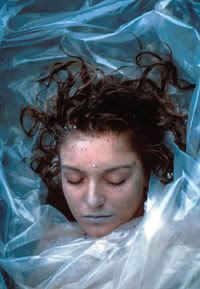After the series concluded its two-season run in 1991, these queries still were gnawing at the show's most devoted fans. So when Lynch and fellow writer/producer Mark Frost announced they were mapping out a film called Twin Peaks: Fire Walk With Me, the enigmatic director's aficionados heaved a collective sigh of relief, since the show's final episode left us with more questions than answers. But, typically, the director wasn't interested in clarifications. Never one for imposing meaning on his work (which has gotten increasingly inscrutable, culminating in his latest, ultimate effort towards cloaked meanings, Inland Empire), his feeling is that vitality seethes in his most confoundedly personal imagery. (Lynch admitted on The Charlie Rose Show that he once went to a psychiatrist but before the secret-spilling began, he asked whether therapy would affect his creativity. The doctor's "yes" abruptly terminated all sessions, and sent Lynch searching for eventual relief in an outspoken enthusiasm for meditation.)
So, instead of taking up at the series' enraging denouement, Lynch opted to set Fire Walk With Me months before Laura was slain. It commences at another riverside town where another, possibly BOB-inspired murder has been uncovered, and then jumps to the Pacific Northwest's pie-and-coffee-and-fucked-upness capital, where Laura (the mesmerizing Sheryl Lee) and fellow victim Ronette Pulaski (Phoebe Augustine) act out their final, horror-filled week among the logging community's slimeballs.
 Much of the original cast returned--Lee, Kyle McLachlan, Ray Wise, Peggy Lipton, Grace Zabriskie, Dana Ashbrook, Eric Da Re, Madchen Amick, James Marshall, Heather Graham, Miguel Ferrer, Chris Isaak, Frank Silva, dancing dwarf Michael J. Anderson, log lady Catherine Coulson, and Lynch himself as Agent Dale Cooper's hearing-impared boss Gordon Cole. But lots of unfamiliar faces popped up, too, including Harry Dean Stanton, David Bowie, Kiefer Sutherland, Jurgen Prochnow, and Moira Kelly (taking over Lara Flynn Boyle's role as Donna Hayward). Angelo Badalamenti's eerie, best-selling score returned, too, as did the rich costume and production design by regular Lynch collaborator Patricia Norris.
Much of the original cast returned--Lee, Kyle McLachlan, Ray Wise, Peggy Lipton, Grace Zabriskie, Dana Ashbrook, Eric Da Re, Madchen Amick, James Marshall, Heather Graham, Miguel Ferrer, Chris Isaak, Frank Silva, dancing dwarf Michael J. Anderson, log lady Catherine Coulson, and Lynch himself as Agent Dale Cooper's hearing-impared boss Gordon Cole. But lots of unfamiliar faces popped up, too, including Harry Dean Stanton, David Bowie, Kiefer Sutherland, Jurgen Prochnow, and Moira Kelly (taking over Lara Flynn Boyle's role as Donna Hayward). Angelo Badalamenti's eerie, best-selling score returned, too, as did the rich costume and production design by regular Lynch collaborator Patricia Norris.

Once largely ignored (except as Laura's black-haired doppelganger cousin), Sheryl Lee emerges as the movie's MVP--wild-eyed, drugged up, confused, screaming with a piercing terror, laughing drunkenly at boyfriend Bobby's bumblings in a flashlit forest. Finally, Lee gets something to do besides play a bluish corpse and the beaming subject of a framed photo! The film's best scene has her staggering towards her fate at a clamorous, strobed-out nightclub where ominous dance music so overcomes the dialogue that subtitles are needed (has there ever been a more accurate club scene filmed?). Lee's reactions per Laura's situation are what provide Twin Peaks: Fire Walk With Me with most of its intensity; it's an energetic, troubled performance that should have netted her more notoriety. But the film was drubbed and shelved, and that was that.
At the movie's 1992 Cannes Film Festival premiere, Lynch gave a patently veiled explanation as to how he arrived at producing a prequel rather than a continuation of his Emmy-winning TV landmark. "I wanted to go back into the world before the series
 and to see what was there, to actually see things we had heard about. For me and I think for pretty much everybody that's ever been, there's a feeling that there might be something like sub-atomic particles existing that we can't seem and x-rays and maybe a few other things out there, and a little opening could exist, and we could go somewhere else. And that idea kind of excites me."
and to see what was there, to actually see things we had heard about. For me and I think for pretty much everybody that's ever been, there's a feeling that there might be something like sub-atomic particles existing that we can't seem and x-rays and maybe a few other things out there, and a little opening could exist, and we could go somewhere else. And that idea kind of excites me."Twin Peaks: Fire Walk With Me was roundly booed by the Cannes audience, and was greeted with poor reviews from dense American critics. But it was a hit in France and Japan and has since garnered somewhat of a rep as an overlooked ne plus ultra by publications like Video Watchdog (who hailed it as "a major event in the cinema of imagination") and Paul A. Woods' excellent Lynch overview Weirdsville USA (which called it "Lynch at ground zero"). See it and, if you can stomach its palpable dread, judge for yourself. I count myself in the "pro" camp, personally.
2 comments:
Nice. I always felt this movie never received the attention it deserved. It has some of the scariest shit I've seen on film in it and it a real head-fuck. And I love it.
"drubbed and shelved"
A good summing up of what happened. For me it's Lynch's best film and one of the greatest I have seen. Sheryl Lee was excellent.
I wrote a very short piece on it last year if you're interested.
http://checkingonmysausages.blogspot.com/2009/04/twin-peaks-fire-walk-with-me-1992-david.html
Post a Comment